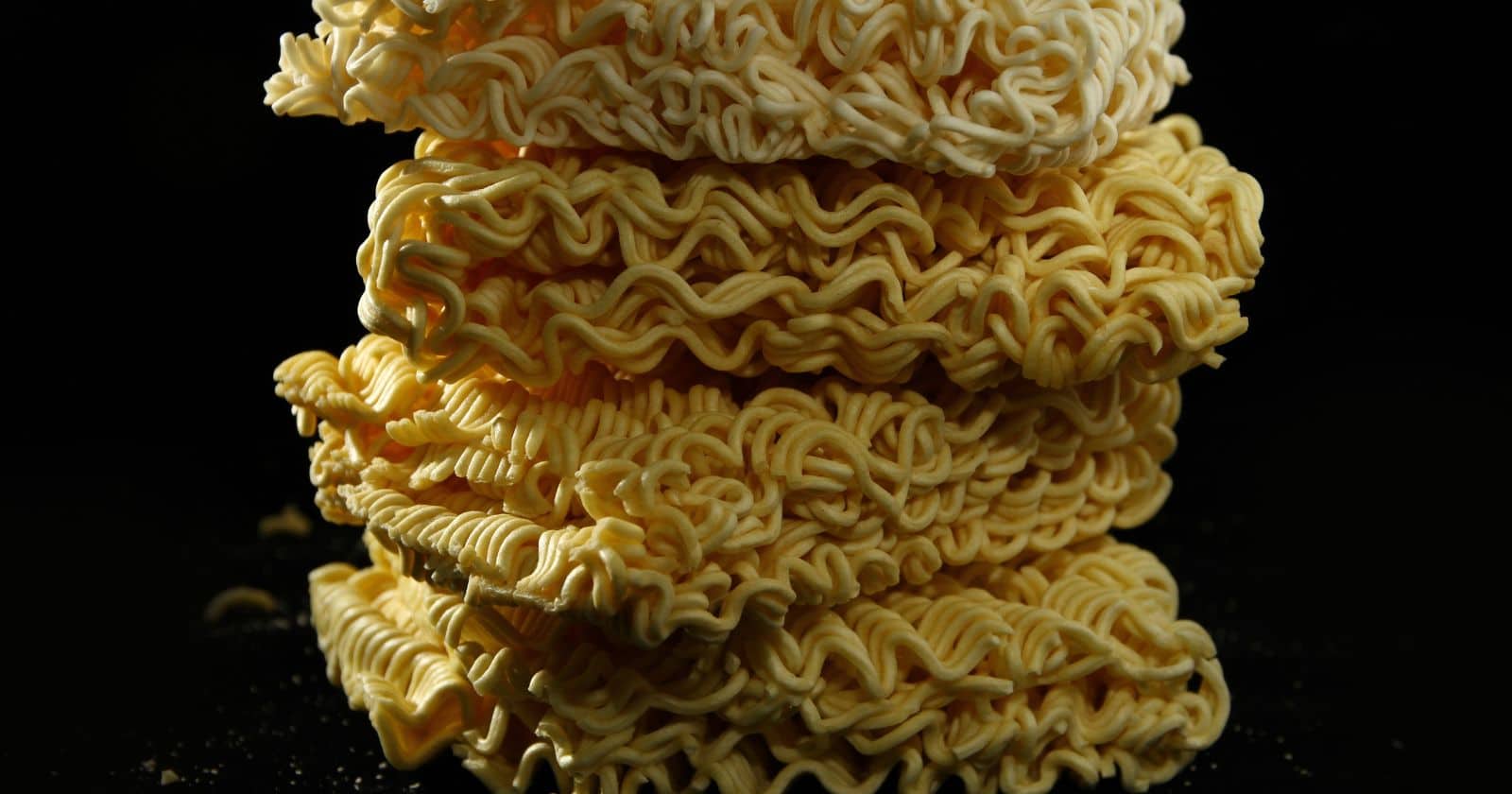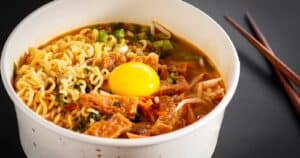Ramen is one of those convenient, tasty meals that can satisfy a craving fast. But what if you want that savory noodle fix without access to hot water? Is it even possible to make ramen using just cold water?
The short answer is yes – you can absolutely whip up ramen using chilled water instead of boiled. While the taste and texture differs somewhat from hot water ramen, with a little creativity and patience, you can still enjoy a hearty noodle bowl.
Here’s the lowdown on crafting delicious ramen without heat:
- The noodles will soften over time in cold water, so no boiling required. Just allow extra soaking time.
- The broth and seasoning flavor will be more subtle since cold water doesn’t dissolve the ingredients as rapidly. But you can punch up taste in other ways.
- Toppings and mix-ins are key for adding flavor, protein, veggies, and crunch to cold water ramen.
- Proper storage keeps ramen safe and optimal for both hot and cold prep.
While hot water extraction boosts ramen’s intensity, don’t let its absence deter you. We’ve got all the tips, tricks, and fixes for DIY ramen sans boiling water. With the guidance below, you can satisfy your noodle craving anytime. So let’s unlock the secrets of no-heat ramen!
The Science of Cold Water Ramen
Cooking ramen in cold water is totally safe and doable. The noodles will eventually soften and become edible, but it takes more time compared to using hot water.
That’s because hot water softens the wheat flour more quickly. Cold water still hydrates the noodles, just at a slower pace. Patience is key when using chilled H2O.
While the taste and texture differs from hot water ramen, you can still make a tasty cold noodle dish. Expect the noodles to be a bit firmer and the broth less intense. But don’t worry, we’ve got you covered on boosting flavor.
Storing ramen properly is crucial, whether using hot or cold water. Fresh ramen lasts about 4 days in the fridge. Instant ramen keeps 2-3 years if stored correctly.
Cold Water vs. Hot Water Ramen
Hot water softens noodles faster and infuses more flavor. That’s why ramen packs specify boiling water. The heat allows the seasoning to dissolve quickly into the broth.
With cold water, be prepared for firmer noodles and weaker broth. It takes time for the noodles to fully hydrate. And the chill inhibits the seasoning from blending into the water.
But while hot water ramen may taste more intense, cold water noodles still absorb liquid and become edible. You just need more patience for the full softening process.
Step-By-Step: Cooking Ramen in Cold Water
Making ramen without boiling water is a cinch. Just follow these simple steps:
- Place dry noodles in a bowl or pot.
- Pour enough cold water to submerge the noodles.
- Let soak 30 minutes until soft and flexible.
- Drain then add seasoning packet or desired toppings.
Remember the noodles and broth will differ from hot water ramen. But this method lets you enjoy noodles without heat access!
Proper storage prevents foodborne illness. Fridge fresh ramen 4 days max. Store instant ramen correctly for 2-3 years shelf life.
What to Expect with Chilled Noodles
Cooking ramen in cold water takes more time but still produces edible noodles. Here’s what to expect:
- Longer cook time: Allow around 30 minutes for full softening. Check frequently for your desired firmness.
- Different texture: The chilled noodles will be firmer than hot water ones. But they still absorb liquid and soften.
- Weaker broth: Less intense flavor since the seasonings blend slower into cold water.
- Less broth: The smaller water volume and cooler temperature produces less broth.
- Storage: Crucial for safety and quality! Fresh ramen keeps 4 days max refrigerated. Instant ramen lasts 2-3 years stored properly.
Alternative No-Heat Cooking Methods
Don’t have 30 minutes for cold water ramen? Try these alternative no-boil ideas:
Soak in Warm Water
Place noodles in warm tap water. Will soften in 10-15 minutes. Noodles retain firm, not soggy, texture.
Flavor Seasoning Soak
Mix seasoning packet with cold water first. Soak noodles 15 minutes to infuse flavor.
Slice Fresh Vegetables
Add crisp veggies like cabbage, spinach, or celery for crunch. Also boosts flavor.
Top with Protein
Cooked meats like chicken, beef, or pork add heartiness. Or a soft boiled egg.
Toast Noodles
Drain soaked noodles, drizzle with oil, and toast in a pan until crispy.
Boost Flavor with Sauces and Toppings
Cold water ramen tastes different than hot, but you can still make it delicious!
- Sesame oil or chili oil for nutty or spicy flavor
- Soy sauce, hoisin, oyster sauce, or miso paste for savory umami
- Sriracha, harissa or chili garlic sauce to add heat
- Lime juice, rice vinegar, or mirin for zesty brightness
- Toasted sesame seeds, roasted seaweed, or furikake for crunch
- Fresh herbs like cilantro, basil, mint, or scallions to brighten
- Soft boiled egg, shredded pork, chicken, or beef for extra protein
With the right combination of toppings and seasonings, you can make chilled ramen taste amazing!
Health Benefits of Cold Water Ramen
Cooking ramen in cold water offers no specific health advantages. The wheat noodles and seasoning contain a similar nutritional profile whether prepared in hot or cold water.
But here are some healthy tips for any bowl of ramen:
- Use reduced sodium seasoning to lower salt intake
- Add lots of vegetables for vitamins and fiber
- Choose whole grain noodles for more nutrients
- Top with lean proteins like chicken, shrimp, or egg
- Limit fatty, processed meats like bacon or sausage
- Skip the “flavor” packets and make your own broth
- Drink plenty of water to stay hydrated with the salty soup
While ramen will never be a health food, these simple tweaks make it a more nutritious option!
Common Mistakes and Troubleshooting
Cooking ramen in cold water takes practice. Avoid these common cooking mistakes:
- Not enough time – Be patient! Allow at least 30 minutes for full noodle softening.
- Insufficient seasoning – Boost flavor with extra spices, oils, sauces, and toppings.
- Improper storage – Fridge fresh ramen for max 4 days. Store instant ramen correctly for 2-3 year shelf life.
- Soggy noodles – Don’t over soak. Drain immediately once noodles reach desired softness.
- Clumped noodles – Use a big enough vessel and stir occasionally to prevent sticking.
It may take some trial and error to nail down the ideal cold water ramen method for your tastes. But with the right techniques, you can enjoy delicious noodle bowls without boiling water!
Satisfy Your Noodle Craving sans Boiling
Next time ramen cravings strike, don’t let a lack of hot water stop you from whipping up a tasty bowl. With cold water, your favorite flavorful toppings, and a little creativity, you can still get your noodle fix anytime.
It does take more time and patience compared to using boiling water. But the wait is well worth it when those seasoned slurpy noodles hit the spot.
So grab a pot, soak those noodles, and start satisfying your ramen fixation with our no-heat hacks. Just remember to store properly and add lots of flavor boosters. Now go and unwind with a chilled-out bowl of ramen!





